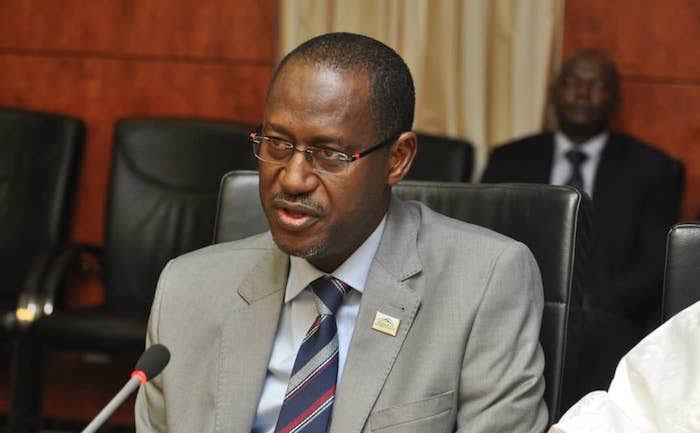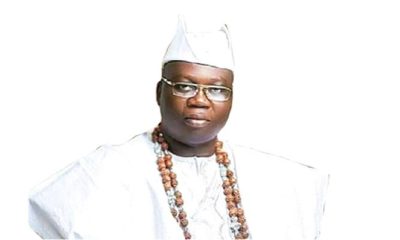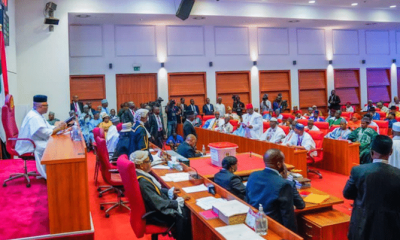National news
Nigeria’s Land Registration Stagnates Below 10% After 140 Years- Dangiwa

- Dangiwa highlighted that the existing land registration system, in place since 1883, has been non-compulsory and sporadic, making it slow, cumbersome, opaque, and costly for the average landowner.
- Senator Aminu Tambuwal, commended the Ministry of Housing
- The minister emphasized that the land registration program would significantly contribute to the formal economy, improve the tracking and regulation of land markets, and enhance citizens’ and businesses’ access to credit.
Nigeria’s Minister of Housing and Urban Development, Ahmed Dangiwa, has raised concerns over the country’s slow land registration process, revealing that less than 10% of the nation’s land has been formally registered in the past 140 years.
Eko Hot Blog reports that Dangiwa made the remarks during the National Land Registration and Documentation Programme (NLRDP) workshop in Abuja on Wednesday.
EDITOR’S PICK
- Several Cars Burnt as Tanker Explosion Rocks Karu Bridge, Abuja
- World Cup Qualifiers: Rwanda vs Nigeria – Match Date, Kick-Off Time, and Viewing Info
- Customs Intercepts ₦72.6m Worth of Smuggled Petrol Bound for Cameroon
In response to the sluggish process, the government aims to increase the formalization of land transactions from the current 10% to over 50% within the next decade.
Dangiwa highlighted that the existing land registration system, in place since 1883, has been non-compulsory and sporadic, making it slow, cumbersome, opaque, and costly for the average landowner.
“It is no surprise, therefore, that less than 10 percent of the entire land in our country has been registered in 140 years,” he said.
He stated that over 90% of the nation’s land remains untitled, representing a potential $300 billion in untapped resources.
The minister emphasized that the land registration program would significantly contribute to the formal economy, improve the tracking and regulation of land markets, and enhance citizens’ and businesses’ access to credit.
“For state governments, it will increase revenue from formal land transactions, improve land market efficiency, and empower marginalized groups, such as women and youth, through formal land ownership,” he said.
According to him the federal government will train and deploy competent land registration officers throughout Nigeria. This initiative aims to standardize land administration processes, decrease reliance on external consultants, and enhance public service delivery, Dangiwa explained.

“For state governments, it will create a skilled workforce capable of handling complex land registration and titling processes, ensure faster and more efficient service delivery, and strengthen collaboration with federal agencies,” the minister noted.
Consequently, the government is planning to develop and launch a National Digital Land Information System (NDLIS) to modernize land administration. This system, according to the minister, will centralize and digitize land records, reducing bureaucracy and corruption in land transactions.
“For the Federal Government, it will improve efficiency, enabling faster processing of land titles and registrations, while for state governments, it will streamline processes, reduce delays, and improve access to accurate and up-to-date land information.
“Let me be clear, this initiative respects the jurisdictional independence of state governments.
Our role is to establish a uniform framework that enables states to build credible, efficient, and interoperable land titling and registration systems, fostering nationwide integration and functionality.

To achieve these objectives, the ministry in 2024 solicited and secured the World Bank’s collaboration on the project,” he said.
Also speaking, the Chairman of the Senate Committee on Lands, Housing, and Urban Development, Senator Aminu Tambuwal, commended the Ministry of Housing and assured that the National Assembly would support the project.
“As Chairman of the Senate Committee on Lands, Housing, and Urban Development, I strongly support the integration of cutting-edge technologies such as Geographic Information System (GIS) and blockchain into the land registration process.
These innovations will enhance efficiency, ensure greater transparency, and secure transactions, reducing disputes and fostering public confidence in the system,” Tambuwal said.
FURTHER READING
- Naira Depreciation, Turmoil in Sudan Drag Our Revenue Down – MTN
- Chaos in House of Reps over Rivers State Emergency Rule Debate
- Reps Shuns Discussion on President Tinubu’s State of Emergency Declaration in Rivers State
The World Bank, represented by Senior Special Assistant Michael Ilesami, stated that the project aligns with the bank’s vision to eradicate poverty and pledged its support.
Click here to watch video of the week
Advertise or Publish a Story on EkoHot Blog:
Kindly contact us at ekohotblog@gmail.com. Breaking stories should be sent to the above email and substantiated with pictorial evidence.
Citizen journalists will receive a token as data incentive.
Call or Whatsapp: 0803 561 7233, 0703 414 5611


















